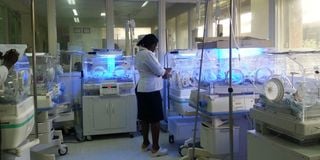AI can predict preterm birth at 31 weeks of pregnancy

A nurse checks on pre-term babies at Kenyatta National Hospital (KNH).
What you need to know:
- An alarming number of 13.4 million infants globally were born prematurely in 2020 and close to one million of these succumbed to early birth complications. This is according to a report by United Nations affiliates.
- This means that nearly one in 10 babies are born before the 37th week of gestation. “In every two seconds, a baby is born too soon globally and in every 40 seconds, one of those babies dies.”
In a quest to reduce the prevalence of preterm births, researchers are exploring innovative interventions to ensure healthier outcomes for both mothers and babies. Now a team of researchers from Washington University have found a way to use artificial intelligence (AI) to analyse electrical activity in the uterus and thereby accurately predict pre-term births.
Pre-term birth is the delivery of a baby before 37 weeks of gestation. According to a new peer-reviewed study published in the medical journal PLOS One, the scientists have developed and tested a deep learning model that can predict preterm births by analysing electrical activity in an expectant woman’s uterus during pregnancy in 30 minutes.
Dr Arye Nehorai, a professor of electrical engineering at the university, highlighted that it is possible to take data as early as the 31st week and predict preterm birth up to the 37th week. “AI/deep learning automatically learned the most informative features from the data that are relevant to the prediction of preterm birth. The findings indicate that preterm birth is an abnormal physiological condition, not just a pregnancy that happened to end early, “ Dr Arye discloses while explaining that during the study, scientists performed electrohysterograms (EHGs) which use electrodes on the abdomen to record electrical activity in the uterus after which they took recordings of these electrical currents from 159 pregnant women who were at least 26 weeks along and "trained" the AI model on that data.
The experts then went ahead to combine data harvested with medical information such as the woman’s age and weight, the fetal weight and any bleeding experienced in the first or second trimester.
The researchers disclosed that EHG measurements usually take between 30 and 60 minutes with additional time required for setting the device on the mother's abdomen though predictions could be made based on shorter measurements of under five minutes without reducing the prediction accuracy.
The study found that nearly 19 percent of the women in the study delivered preterm which is why the data from those women could be used as a benchmark for predicting premature birth.
"The advantage of our approach is that is inexpensive to build," Professor Nehorai pointed out while dissecting their findings.
"Our model was effective in prediction with shorter EHG recordings, which could make the model easier to use, more cost-effective in a clinical setting and possibly usable in a home setting," he said while assuring that their work contributes to the goal of using EHG measuring devices for accurately predicting preterm birth.
An alarming number of 13.4 million infants globally were born prematurely in 2020 and close to one million of these succumbed to early birth complications. This is according to a report by United Nations affiliates. This means that nearly one in 10 babies are born before the 37th week of gestation. “In every two seconds, a baby is born too soon globally and in every 40 seconds, one of those babies dies.”
The Born Too Soon report highlights that Kenya is among countries that have recorded moderately high preterm births (below 10 per cent) with the total number of preterm babies that were born in 2020 being placed at 127,500 out of 1,455,900 children born that year.





